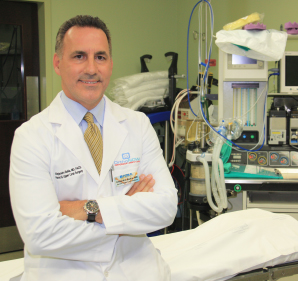He takes his Hippocratic Oath seriously, committing to “apply all measures which are required” for his patients. A nationally recognized orthopedic surgeon, Dr. Alejandro Badia has pioneered a rapid response clinic for hand and arm injuries and conditions with his OrthoNow practice in his Miami hand surgery center. This year, Badia expands his practice to New York City, where he will open his first OrthoNow clinic, a specialized “walk-in” center offering top-notch treatments at top speed.
“If ever there was a place that required immediate care, it’s New York. The city moves at a breakneck pace, and we want to offer New Yorkers the rapid care they deserve,” says Badia. “Our goal is to offer New Yorkers a better option than hours in a hospital or ER waiting room alongside someone with the flu, suffering a heart attack or worse.” Beyond that, Badia adds, “It’s also about treating patients more efficiently, putting the focus on specific care to get ahead of patients who are ‘doctor or pill shoppers.’”
WELL-ARMED
Dr. Badia’s upper-limb orthopedic hand surgery specialty is central to day-to-day life, with hand and arm injuries among the most common suffered at work and home. The reason is simple—most of us work with our hands. A fact that’s easy to forget when most attention in the orthopedic community is given to the treatment of star athletes or cosmetic procedures.
While celebrity sports medicine practitioners focus on knees and shoulders, Badia’s team focuses on upper limb issues of the hands, wrists, and elbows. “Of course, we treat athletic injuries too, but it’s a diverse specialty. We do everything from congenital birth defects to arthritis and carpal tunnel.” Badia quickly notes that carpal tunnel is one of the most common afflictions hand surgeons treat. It’s caused by a pinched nerve in the wrist from keeping them in a flexed position (often at a keyboard) for a prolonged period.
ACCESS TO GOOD HEALTHCARE
With the wide disparity of care around the world, most notably here at home in the U.S., where healthcare is an ongoing debate and insurance companies often dictate the level of care a patient receives, Badia says, “There’s a major lack of access and equality to healthcare, and we are so far from where we should be, considering our collective expertise. Part of that is the incredible waste in the system. The bureaucracy has gotten completely out of control. There are all of these talking heads in the media, but most of the people we hear from have not been in the ‘trenches.’ The problem is we are not hearing from the doctors. They’re the people delivering the care.”

This was never more evident than during the pandemic experience of the last two years, which continues to have seismic effects on the healthcare system. Those overburdened staffs leave the industry in droves after being stretched to exhaustion with resources overextended or tapped completely. Nevertheless, Dr. Badia holds hope for the future. “If there is any positive takeaway from the devastation of the pandemic, it’s that we finally started shedding light on frontline healthcare workers and have listened to them.”
Badia believes this is an opportunity. “We’re on the brink of what some folks in the industry have nicknamed ‘Healthcare 3.0.’ There will be a shift in healthcare delivery that will be much more efficient, and out-patient based because people are and always have been afraid of hospitals, and the simple fact is we don’t need to treat everything there.”
As he predicts a healthcare “reset,” Dr. Badia believes that OrthoNow is at the forefront of this shift, offering cost-effective specialized out-patient care.
The Hippocratic Oath lays it all out: the health and well-being of my patient will be my first consideration. But, Badia concludes, “the bottom line is people need more than treatment; they need the right kind of care.”
For more information on Dr. Alejandro Badia,
visit: orthonowcare.com




